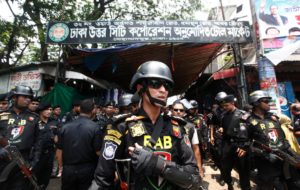
By Kamran Reza Chowdhury on Jun 13, 2018
The United States urged Bangladesh on Wednesday to meet its human rights obligations while expressing concerns over reports that security forces had killed at least 147 people and arrested 21,000 since mid-May in a nationwide anti-narcotics campaign.
Prime Minister Sheikh Hasina’s government launched the anti-drug campaign on May 15 to combat the spread of yaba, a tablet that contains methamphetamine and caffeine.
“We urge Bangladesh to conduct thorough and transparent investigations into all credible reports of extrajudicial killings,” State Department spokeswoman Heather Nauert said in a statement.
Bangladeshi authorities had branded those who were killed as drug dealers and claimed they were gunned down during shootouts with police or in gang wars. Rights groups have accused the government of summarily executing suspects during police operations that mimicked Philippine President Rodrigo Duterte’s drug war.
“While illegal drugs are a scourge across the world, Bangladesh should ensure its law enforcement respect human rights and that their conduct is consistent with international standards and Bangladesh’s own constitution, which includes a presumption of innocence and the right to due process,” Nauert said.
“We look to the Government of Bangladesh to fully meet its human rights obligations,” she added.
Responding to Nauert’s statement, Bangladeshi Home Minister Asaduzzaman Khan Kamal insisted that “no extrajudicial killings took place in the ongoing anti-drug drive.”
He said the country’s law enforcement agencies had been trained to respect human rights and that Bangladeshi authorities would conduct investigations into all incidents.
“The law enforcing agencies reserve the right to fire to protect themselves when they come under attack of the criminals,” Khan said.
Concerns
The state department statement adds to growing international pressure on the Bangladesh government to end the drug war.
Last week, a global network of 177 non-governmental organizations urged the United Nations to intervene.
“Evidence worldwide has shown that such a violent and abusive approach has not managed to curb the illicit drug market, but it can be used as a political tool to win political elections and target unwanted opposition,” the International Drug Policy Consortium said in a statement.
Authorities estimate that about 300 million yaba pills were smuggled into Bangladesh from neighboring Myanmar last year.
On June 6, Human Rights Watch (HRW) urged Hasina to order an independent investigation into allegations of extrajudicial killings spawned by the campaign. On the same day, U.N. human rights chief Zeid Ra’ad al-Hussein condemned the killings that began after the government launched its “zero tolerance” campaign a month ago.
HRW cited the killing of a local official, Akramul Haque, on May 27. Mizanur Rahman, former chairman of the National Human Rights Commission, called for an investigation into the killing after Haque’s widow produced tapes of a phone call that, according to her, proved he was killed after authorities accused him of being a drug dealer.
Bangladesh, a nation of more than 163 million people, has been struggling to combat narcotics for years.
Source: Benar News
